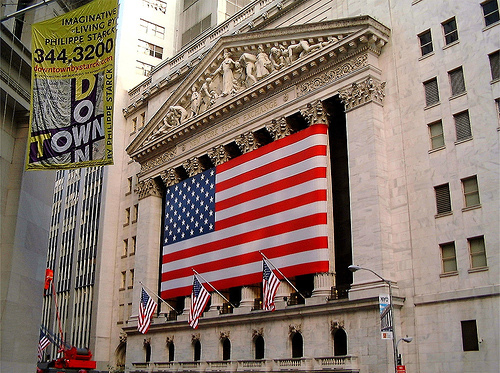
From the November 2008 Idaho Observer:
"Bailout" reveals true U.S. capital: Wall Street

The "Economic Stabilization and Recovery Act" was initially a three-page proposal by the Bush Administration. It expanded to a 110-page amendment attached to an unrelated bill that was rejected by the House Sept. 29, 2008. The bill expanded to 422 pages, was passed overwhelmingly in the Senate Oct. 1, was quickly passed in Congress by a margin of 263-171 and was signed into law by President Bush Friday, October 3, 2008.
With that many pages, one would expect several to be dedicated to stringent oversight provisions. Sen. Judd Gregg even stated after the Senate passed the bill, "We put in place tremendous regulatory oversight so that there will be absolute transparency."
"Yet ask the most basic question - how exactly are the banks using your money and the answer can’t be found," commented Sheryl Attkisson of CBS News in a report dated Nov. 12, 2008.
According to Attkisson, the Treasury Department agreed to post every transaction on the Internet, but all it shows is the list of banks and how many billions they got."
The "buyout" bill authorized the creation of the "Financial Stability Oversight Board [FSOB]," that, according to Attkisson, has met four times already but cannot explain how the money is being spent even in its first report to Congress.
Congress itself reportedly promised to form an oversight committee to oversee the FSOB but has yet to do so.
Unable to find answers as to where $700 billion (which, by some estimates has magically increased to over $5 trillion) through government sources, Attkisson said that CBS contacted nine of the biggest bailout bucks recipients. While not mentioning any names, Attkisson said the spokespersons for the nine "…pointed out there’s nothing in the bailout law that requires them to disclose specifics."
Though Congress allegedly has the power to discontinue authorizing the disbursement of bailout bucks for cause, there seems to be no intention on the part of Congress to demand accountability from the Treasury, the Federal Reserve or those receiving billions of dollars to ostensibly stabilize and recover the economy. "[A]s one bank official put it: If anyone thought for a minute that every penny was somehow going to be tracked, they’re going to be sorely disappointed," Attkisson concluded.